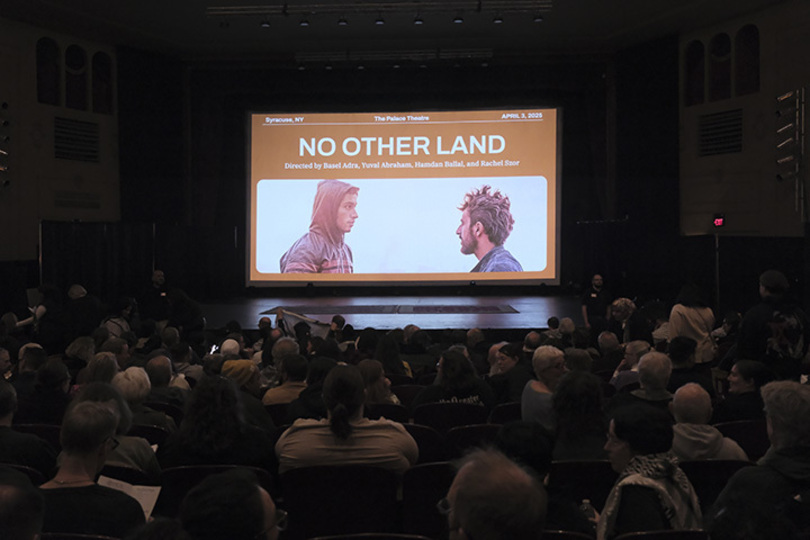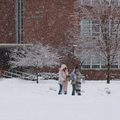Jewish Voice for Peace screens “No Other Land,” detailing occupation of West Bank

“No Other Land” was filmed from 2019 to 2023, and chronicles Basel Adra’s community of Masafer Yatta as Israeli citizens force out the Palestinians living there. The movie doesn’t have a wide distributor in the United States. Maxine Brackbill | Senior Staff Photographer
Get the latest Syracuse news delivered right to your inbox.
Subscribe to our newsletter here.
Basel Adra’s first memory is from when he was 5 years old. His father, Nasser, was arrested by the Israeli Defense Force. As Adra got older, his community, Masafer Yatta, experienced increasing conflict with Israel.
Adra started filming “No Other Land” to document the effect of Israeli civilians’ and the IDF’s presence in the community on Masafer Yatta.
“I started filming, when we started to end,” Adra narrates in the documentary.
On Thursday, Jewish Voice for Peace’s Syracuse chapter and the Syracuse Peace Council hosted a screening of “No Other Land” at the Palace Theater. Funds generated from the screening went to HEAL Palestine, a nonprofit that provides aid to Palestinian children affected by the ongoing Israel-Hamas war.
Filmed from 2019 to 2023, the documentary focuses on Masafer Yatta, a West Bank community of 19 Palestinian villages, as residents are forced out.
The documentary centers around Palestinians in the West Bank, not Gaza, which is important for audiences to be aware of, Lee Cridland, a staff organizer for SPC, said. Since Oct. 7, 2023, much of the focus has been placed on Gaza rather than the West Bank, she said. The West Bank is home to over 3 million Palestinian people.
Adra directed the documentary with three others, including Yuval Abraham, an Israeli journalist, and Hamdan Ballal, who was attacked and detained in the West Bank shortly after the movie won the Oscar for Best Documentary Feature Film.
Despite winning Best Documentary, the film doesn’t have a distributor in the United States, so independent theaters like the Palace have hosted small screenings. Thursday’s screening sold out in about two weeks, organizers said, and many people have reached out to ask for another screening.
Adam Ast, general manager of the Palace, gave JVP and SPC the cheapest possible rate to screen “No Other Land,” figuring that the space should be used for anybody with zero judgment.
“This is an Oscar-winning documentary,” Ast said. “It’s about a subject that’s relevant and important to the world. The injustices are put up on the screen, footage that you really can’t deny.”
Before and after the screening, the audience heard remarks from Rachel Bass, a member of the Syracuse chapter of JVP, Syracuse University history professor Osamah Khalil and graduate student Cai Cafiero, who was a member of the Gaza Solidarity Encampment on SU’s campus last spring.

Rachel Bass, Osamah Khalil and Cai Caitello discussed American nonprofits funding Israel’s war in Gaza and the recent arrests of student activists by the Trump administration. Khalil said “No Other Land” reveals the “reality” of “Israeli apartheid” in the West Bank.Maxine Brackbill | Senior Staff Photographer
Bass opened the screening by thanking the night’s sponsors and reading a land acknowledgement recognizing the Onondaga Nation, the Indigenous people of present-day Syracuse.
“We must work to uplift voices from within Indigenous communities who are fighting for land back and recognition of their sovereignty,” Bass said. “We ask that you keep this in mind as you watch the film tonight.”
Khalil said that according to a Brown University study, the United States has funded 70% of Israel’s war in Gaza. Nearly $18 billion in U.S. military aid went to Israel between Oct. 7, 2023 and Sept. 30, 2024, the study found.
“It is yet another American genocide,” Khalil said. “It comes at a time when we as Americans are told we can no longer afford basic social services and entitlements, but there is always money for war.”
Khalil said there’s a tendency in the US to view everything through the lens of October 7, which ignores that Israel’s policies of “displacement and annexation are not new, nor a response to October 7.”
“‘No Other Land’ reveals a very different reality,” Khalil said. “It demonstrates the reality of Palestinian lives for nearly six decades of Israeli occupation and apartheid.”
Masafer Yatta falls under “Area C,” which constitutes around 60% of the occupied West Bank and is under full administrative and military control by Israel.
“The goal, as you saw in the film, is quite simple: to take and force Palestinians off the land and push them into cities,” Khalil said.
The Israeli courts designated the area as a military training ground in 2022, which gave the IDF legal authority under Israeli law to evict Palestinians from their homes. In the documentary, bulldozers and construction crews enter Masafer Yatta. A court-appointed executor came to the community to place eviction notices on houses and playgrounds.
In one scene, Israeli soldiers evict students and teachers from an elementary school and then bulldoze the school. In another, a child asks her mother, “Are we going to live in a cave now?” after their home is torn down.
At many points in the documentary, Adra and Abraham run to teardown sites to film villagers as they are forced out of their homes. In one scene, Abraham yells to the executor that he has refused Palestinians’ requests for building permits.
Adra narrates the documentary from his perspective as a Palestinian. He and Abraham form a close relationship, but Adra illustrates the differences they face by showing their contrasting mobility rights.
Adra points out that Israeli cars have yellow license plates, while Palestinian cars have green plates. Adra says the yellow plates grant freedom of movement out of the West Bank, while cars with green plates are prevented from leaving.
“A world built on a division. Yellow man. Green man,” Adra narrates.
The fact that the film cannot find a distributor is “telling,” Cridland said. She said those who speak out about the issue in support of Palestinians are often labelled as antisemitic, which she said isn’t the case. She said freedom of speech is an important part of America’s history, but there’s been a “chilling effect” around the topic of Palestine.
Another organizer of the event, who chose to remain anonymous because of President Donald Trump’s administration’s recent targeting of student activists, agreed with Cridland. The organizer said a large reason why the documentary still doesn’t have distribution is because stories and voices from Palestine are restricted in the West.
The anonymous organizer added that the organizers were initially excited when the movie won Best Documentary, as that increased the movie’s exposure, but their excitement was short-lived — soon after, Ballal was attacked.
The last footage Adra captured in October 2023 shows armed Israeli civilians at the edge of his village. As a villager confronts them, he is shot. Text on the screen reads that villagers began to leave Masafer Yatta and their homes behind, though others remained.
“We have no other land. It’s our land,” Adra narrates. “That’s why we suffer for it.”





